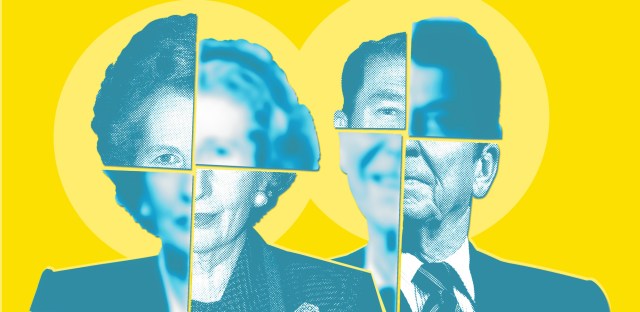Graphic by Krieg Barrie

Some would argue that nearly forty years after they were first elected to office – with the Berlin Wall gone, the internet invented, China transforming the world economy, and with popular attitudes to issues like homosexuality transformed – there’s not much point trying to think what Thatcher and Reagan might teach policymakers as they grapple with the challenges of our times. Moreover, large numbers regard the legacies of the two leaders as deeply destructive and want their ideas buried alongside these two now deceased co-belligerents. Whoever is right, many other Britons and Americans – especially from within the two parties they led – do look to Reagan and Thatcher for guidance. The Washington-based conservative think tank, the Heritage Foundation, even ran a What Would Reagan Do? feature on its website for a time. This mimicked the What Would Jesus Do? saying that was once very popular amongst US evangelicals and the copy-catting illustrated the almost god-like status that the former president enjoyed (and enjoys) amongst many on the American Right. In Britain, not many Tory Associations have pictures of John Major or David Cameron on their walls today but portraits of Thatcher are often still evident – even though she left office 27 years ago, and before both of her male Tory successors.
If Tories and Republicans are to look to these two leaders from the 1980s it’s probably useful for them to be properly understood. Unfortunately, I’ve long believed many Right-wingers misremember Thatcher and Reagan, almost as much as those on the Left do. In particular, they remember the times when they were boldly ideological – against the “Evil Empire” of the Soviet Union or in tackling striking air traffic controllers or coalminers. They forget how they declined to cut welfare or health provision in any significant ways and the times they occasionally raised taxes. Reagan would not be on the ‘right’ side of the tax pledge introduced by Grover Norquist and which helps explain why no Washington Republican has a voted for any tax increase since 1990.
Over the next six days, therefore, we’ll be running clips from an interview UnHerd conducted with Charles Moore, The Daily Telegraph columnist and official biographer of Margaret Thatcher and Henry Olsen, Editor of our Flyover country theme and who, last year, published a new book on Reagan that attempted to argue that he was not the economic libertarian that some claim he was.
We begin with Charles Moore explaining what Mrs Thatcher meant by her controversial “there is no such thing as society” quote and Henry Olsen putting Reagan’s “government is the problem, not the solution” in context. And, wow, what a context. Reagan added, critically, “in this present crisis” to those words and the rest of his first inaugural included important promises to safeguard a wide range of government provisions. He was, as Henry’s book contends, a “New Deal” Republican – preferring to save rather than dismantle the systems of social protection that were often built by Democratic Party opponents.
In the second clip of this series, to be published tomorrow, the two authors will discuss how Thatcher and Reagan reached out to low income workers.
Buy a copy of Charles Moore’s book(s) via this link and Henry’s “The Working Class Republican” via this one. Other booksellers are available!
Additionally, the video below providers a three minute summary of the key arguments in Henry’s book.










Join the discussion
Join like minded readers that support our journalism by becoming a paid subscriber
To join the discussion in the comments, become a paid subscriber.
Join like minded readers that support our journalism, read unlimited articles and enjoy other subscriber-only benefits.
Subscribe